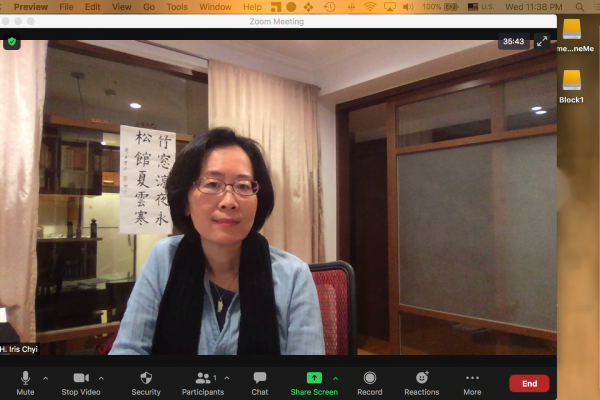In associate professor Iris Chyi’s office, on the 10th floor of an apartment building overlooking the tallest building in Taipei, Taiwan, there are two clocks.
The first hangs on the office wall and shows the local time. The second, a square desk clock about 4 inches tall that reads 13 hours behind, reminds Chyi of the time in Austin.
For most University of Texas employees, it’s been challenging to adjust their lives and routines to the isolated online world of the COVID-19 pandemic. Many miss face-to-face interaction, live discussions or debates in a lecture hall, or meeting new people. For Chyi, an associate professor in the School of Journalism and Media, adjusting to an online semester has meant teaching her students in the U.S. during the dark early morning hours in Taipei. But Chyi says that it hasn’t been as difficult as she had feared and that she found unexpected advantages to this new normal with the help of her students.
Chyi usually lives in Round Rock with her 76-year-old mother, and they would visit Taiwan, Chyi’s birthplace, in the summer. But she decided they should move to her mother’s apartment in Taipei so her mother would have full health coverage if anything were to happen during the pandemic.
Before making the decision to move, Chyi recalls, she watched the local Austin news one night and was concerned with the lack of COVID-19 testing when the pandemic began.
“In a way, I felt I had no choice,” she says. “I had to take her back. Otherwise, it would be unimaginable.”
Chyi usually teaches two courses per semester, but because some incoming graduate students had problems acquiring visas, in fall 2020 she taught only one for undergraduate students: Domestic Issues and Global Perspectives. Diverting from her expertise in media economics and user demand for multiplatform newspapers, Chyi created this course in 2013 after she says she noticed that many American journalists talked about social problems from a single perspective without acknowledging that there are possible solutions and alternatives in other countries, regions and cultures.
Chyi also draws upon her experience as an immigrant to teach students about what she has lived, rather than only what she has been taught — inspiration she says she drew from a book by her colleague professor Stephen Reese. Alongside teaching how consumerism, sustainability, and food and health issues impact other countries, she also educates students about practical, real-world challenges such as budgeting and mortgage interest rates.
“We could talk about economics or media studies, but how I have lived my life perhaps is more important or meaningful,” Chyi says. “That’s something a teacher could offer.”
Her course Domestic Issues and Global Perspectives forces students to examine the U.S. from an outsider’s view and exposes them to how the same social issues affect people in other countries. Chyi says that teaching this course from across the Pacific Ocean instead of in her usual windowless classroom on the sixth floor of the CMA Building had advantages that she will always remember.
While it was difficult to not be confused by the time difference, and napping was definitely necessary, Chyi says she also liked having more time to prepare as opposed to her usual hectic days when commuting from Round Rock to Austin for two back-to-back courses in person.
Before the fall semester started, Chyi says she was worried about online participation but then felt lucky because of how motivated and engaged her students were.
“With this particular class, I think we could share things freely, and then we exchanged our ideas genuinely, in sincere ways,” Chyi says. “I think that’s the key. I think as a class we overcame those (technical) difficulties.”
For the spring 2021 semester, Chyi is teaching two courses. She begins her Digital Production and Analytics class at midnight, followed by Domestic Issues and Global Perspectives, which concludes at 4 a.m.
The cross-cultural comparison that students practice in Domestic Issues and Global Perspectives is something that Chyi says she does automatically every day as an immigrant with a different native language and cultural background. Chyi moved to the U.S., after completing her bachelor’s degree in Taiwan, to earn her master’s in communication from Stanford University and eventually her doctorate from UT.
As an outsider, Chyi says that when she started teaching in the U.S., she felt the need to perform or act in a certain way. She worried about whether her English was good enough, whether her accent was too strong or whether she would understand the jokes that people tell.
“You don’t want to look odd,” Chyi says. “You are from a totally different place, but in the States you somehow wanted to make sure you perform equally well. It’s typical among newcomers because they are afraid of being seen as out of place or even inferior.”
But once Chyi realized that she had something different to offer and could contribute a viewpoint that most people don’t have, she used that to her advantage. Now Chyi encourages graduate students from different cultural backgrounds to remember that they have something unique to offer.
“In a way, I’m very aware now that my status as a new immigrant, or maybe not so new, is something I don’t have to feel sorry about,” Chyi says. “I think students’ feedback gave me that confirmation.”




